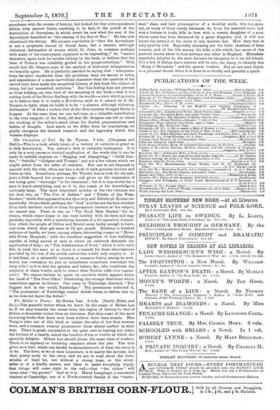The Curiosities of Toil. By Dr. Wynter. 2 vols. (Chapman
and Hall.)—This is a book which treats of a variety of subjects so great as to defy description. The author's title is certainly inadequate. It is only by a very jocose or ironical application of the words that it can be made to include chapters on " Begging and Almsgiving," " Child Mur- der," " Suicide," "Cadgers and Tramps," and not a few others which we might select from the table of contents. But one is not disposed to quarrel with the title, when one has a book of such genuine interest and value as this. Sometimes, perhaps, Dr. Wynter has to look for his sub- jects a little beyond his proper range, and gives us the impression of not being quite " thorough " in his treatment ; but it is impossible for a man to know everything, and, as it is, the range of his knowledge is curiously large. The most important articles in the two volumes are the first two, on "The Use of Refuse" and "Tricks of the Wine- Dealers," which first appeared in the Quarterly and Edinburgh Reviews re- spectively. On the whole, perhaps, the "food" articles are the beat, whether from their intrinsic merit or from the permanent interest of the subject, we cannot say. There is one on "The Dead Meat Market," for in- stance, which comes home to one very forcibly with its facts and sug- gestions, especially with a tantalizing account of a Co-operative Associa- tion which the people of Clifton and Bristol seem lucky enough to have, and from which they get meat at 7d. per pound. Relating to kindred subjects of health, we have, among others, interesting essays on " Move- able Fever Hospitals," with the excellent suggestion of iron buildings capable of being moved at once to where an outbreak demands the application of help ; on " The Adulteration of Food," which it stirs one's bile to read, the more so as there is a remedy for these abominations provided by the law, if the parish authorities would only employ it. Is it indolence, or a miserable economy, a common frenzy among us now, which has overtaken us, just as miserliness sometimes overtakes the very rich ? or it is that the grocers and bakers, dzc., who constitute the majority of these boards, seek to secure what Tacitus calls vices inzpuni- tatis? We cannot forbear to quote an anecdote which appears under the head of " The Post Office," illustrating the strange directions which sometimes appear on letters. One came to Tunbridge directed, "The biggest fool in the world, Tunbridge." The postmaster endorsed it, "The postmaster of Tunbridge cannot decide whom to deliver this to, as he does not know the writer."






























 Previous page
Previous page